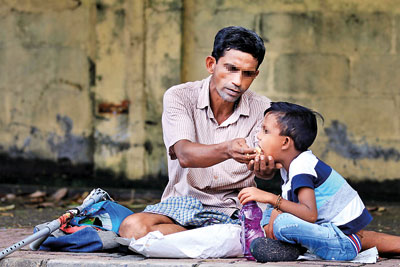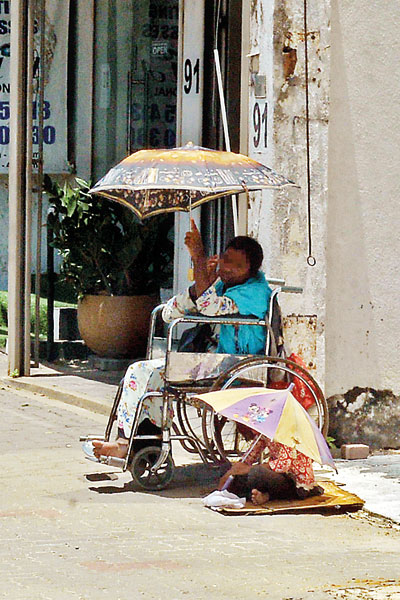News
Street children, the responsibility of many agencies and individuals
View(s):By Minaza Hassan
Although adequate laws prohibiting child labour have existed for a long time, their implementation has been weak.
Several reports made to the National Child Protection Authority (NCPA) regarding children being used for begging in various parts of the city were not adequately addressed by the police, to whom the complaints had been forwarded, said Director of Law Enforcement from the NCPA, Sajeewani Abeykoon.

In many cases, once the police arrive, they simply report that the child is no longer at the location. Pix by Eshan Fernando
For instance, in many cases, once the police arrive, they simply report that the child is no longer at the location, said Ms. Abeykoon.
Subsequently, to address this, raids have taken place with the coordination of the Police’s Children and Women Bureau and the NCPA to identify and remove children from exploitative situations.
According to the Employment of Women, young persons and Children Act, children under the age of 16 years cannot be employed and children who are aged 16-18 years cannot be employed in occupations considered ‘hazardous’. This is in consideration with how it would affect the child’s mental or physical health, said Secretary, Women and Child Affairs, K. D. R Olga.
“In such circumstances our officers do not have the authority to take children into custody, we report to the police in such situations and the matter is brought under judicial review,’’ explained Ms. Olga.

If the child’s parents are not considered suitable, the next of kin may take the child into custody, and if that is not an option, the child may be taken to a Child Development Centre (otherwise referred as an orphanage), said Ms. Olga.
There are over 300 Child Development Centres in Sri Lanka, of which 48 are state-run. The remainder are managed by private or non-governmental and civil society organisations, said Ms. Olga.
Provincial Councils are responsible for the budget of these centres and the Ministry of Women and Child affairs oversees all of them and their maintenance according to relevant criteria, said Ms. Olga.
However, certain concerns, such as a child’s mental health, are not always addressed in some of these centres as they are often understaffed, Ms. Olga explained.
Steps have been taken to address this issue and discussions are taking place with provincial probational commissioners, said Ms. Olga.
Additionally, some parents from low-income urban communities have told authorities that they bring their children with them while engaged in street-based labour because they have no childcare options or a safe place to leave them, said Ms. Olga.
In response, setting up of affordable day care centres has been proposed to support low-income families and reduce the exposure of children to the streets, Ms. Olga said.
Causing or using a child to beg is an offence under the Penal Code (Amendment) Act, No. 29 of 1998, and it is punishable by a term of imprisonment of up to five years, along with a possible fine, said Ms. Olga.
The aim is to end child labour, this includes using children for begging and domestic work, said Ms. Olga.
Yearly, an estimated 100 children needing protection have been taken into custody, said Deputy Inspector General of Police (DIG), Children and Women Abuse Investigation Range, Renuka Jayasundara.
So far, 90 children have been taken into custody this year, she said.
However, these issues are often under-reported. There is a need to raise social awareness about child exploitation. Certain responsibilities must be taken up by the institutions, such as schools and hospitals that children often interact with, in identifying and addressing such cases. Schools, in particular, should be more proactive in recognising signs of neglect or exploitation, said DIG Jayasundara.
Children are often put in these abusive and exploitative circumstances due to poverty, said Criminologist and Senior lecturer at the Department of Sociology in University of Kelaniya, Dr. Anusha Edirisinghe.
The environment that these children are exposed to may encourage criminal behaviour, as children in these situations confront many issues including the lack of a support system, guidance and education, said Dr. Edirisinghe.
The laws address the symptoms and not the root cause, the social issue of poverty must be addressed, Dr. Edirisinghe said.
The best way to say that you found the home of your dreams is by finding it on Hitad.lk. We have listings for apartments for sale or rent in Sri Lanka, no matter what locale you're looking for! Whether you live in Colombo, Galle, Kandy, Matara, Jaffna and more - we've got them all!

